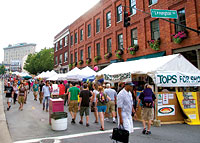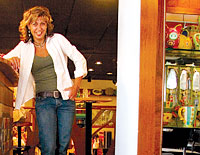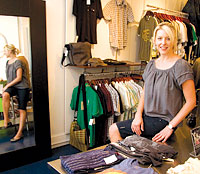Bele Chere, the name of Asheville’s annual three-day summer blowout, roughly translates as “beautiful living,” but a lot of downtown merchants say there’s nothing pretty about what the popular festival does to their business.

Launched in 1979 by a handful of downtown merchants to give the city’s then-moribund economy a boost, Bele Chere has now become the Southeast’s biggest free street party, drawing hundreds of thousands of folks from near and far each July. Meanwhile, downtown itself has morphed from a cluster of boarded-up buildings into a dynamic, attractive central business district. But rather than giving small businesses a shot in the arm, many downtown merchants say they now dread the festival’s arrival each year.
Anna Sagel owns Ad-Lib, an upscale women’s clothing boutique on Haywood Street near Pritchard Park. And despite her efforts to work with the festival, such as buying outdoor booth space designed to draw customers into the store, Sagel says she typically sees her receipts cut in half during Bele Chere—especially on Saturday when crowds are at their zenith.
“July and August are our peak months, so for me to have that level of business for a Saturday is just sad,” she says about the festival, which runs this year from July 27-29. “Without the booth, we would have been dead in the water.”
Apparently, somebody’s making money at Bele Chere, however. A 2005 study and visitor survey conducted for the city by two Western Carolina University professors who specialize in tourism pegged the festival’s local economic impact at $12.4 million in direct spending. But most folks are spending their pocket money at street booths rather than in stores, the study indicates. For example, the study found, two-thirds of the visitors surveyed bought their beverages from street vendors rather than stores.

Earlier this year, the city mailed a survey to merchants and residents in the central business district to gauge their feelings about the event. The results favored Bele Chere. However, a significant percentage of businesses that were surveyed indicated displeasure. Nearly 20 percent of the merchants said they closed for the event, while 38 percent said they lost money during Bele Chere.
For her part, Sagel emphasizes that she doesn’t speak for all downtown merchants, despite the significant number of complaints she’s heard over the years from other businesses. As the city’s 2007 merchant survey seems to indicate, plenty of business owners still view Bele Chere as a good thing for downtown business overall.
At Somethin’ Different, a shop at the corner of Patton and Coxe avenues that sells sundry items and novelties ranging from T-shirts to smoking accessories, store manager Rev Covington says the event has been a positive experience, with no loss of business.
“It’s a great time over here. We love it; we have fun,” says Covington, adding that he expects receipts to be average or better while noting that last year was “really good.”
“We have more fun than anything,” he says. “Fun. That’s mostly what we’re all about.”
Sagel, however, says that things were even worse for her business when it was on Biltmore Avenue near Barley’s Taproom (she relocated a couple of years ago). With a music stage right outside, Sagel couldn’t open her doors without “getting blasted out,” she says. “And if we kept our doors closed, people thought we were closed.” If that weren’t bad enough, having festivalgoers lined up seven-deep outside the door drove potential customers away—while trapping employees inside an empty store. “We couldn’t even get our cash drawer back down to the store” from their booth, recalls Kathryn Strohl, Ad-Lib’s manager.
Sagel remains less than thrilled about Bele Chere, but her store’s new location at least provides more open space and is away from the music stages yet right in the heart of the action. Together with the booth Sagel operates outside her store, that at least gives her a chance to compete for shoppers’ attention and bring them indoors, she says.
The problem, as Sagel sees it, is that festival attendees are drawn to the hundreds of booths that line the streets, in many cases eclipsing the very businesses Bele Chere was largely meant to help. To make matters worse, a lot of those booths are run by out-of-town vendors or local entrepreneurs who aren’t downtown merchants. Sagel suggests that the city’s Bele Chere Committee, which coordinates the festival, give downtown merchants first preference in renting booth space—in front of their businesses whenever possible.
The situation, she maintains, is equally hard on restaurants and bars, which festivalgoers often spurn in favor of booths selling finger food. You can’t go into a local pub “to buy a decent beer” and walk around outside with it, “but you can buy your cheap Bud on the street and walk around with that,” says Sagel.
“We still do the booths, because what we still find is that people are literally walking down the street looking at booths,” she says. “They are booth-shopping; they are not [store]-shopping.
But even then, she points out, you incur extra expenses and are forced to have “all hands on deck,” since booths must stay open until 9 p.m. “And we have to advertise ourselves and sell ourselves harder.”
In a February public forum on the future of Bele Chere (see “Residents Weigh in on Bele Chere’s Future,” Feb. 7 Xpress), Dwight Butner, president of the Asheville Downtown Association, suggested moving the festival to some other month when business is typically slower and the influx of people could really do some economic good.
“People don’t see it as helping their business,” said Butner, who also serves as the Downtown Commission’s liaison to the Bele Chere Committee.
Another man at the same forum echoed Butner, saying that having Bele Chere in July—one of the city’s peak months for tourism—amounts to overkill. “It’s kind of like bringing an extra dish to Thanksgiving dinner,” he said.
A brighter outlook
But Butner, who owns Vinzenzo’s Ristorante downtown, says the city is actively trying to address the concerns of merchants such as Sagel.
“Bele Chere is an evolving process, and the festival itself is undergoing a lot of self-reflection and introspection as the result of the February public forum,” he told Xpress following a July 13 meeting of Bele Chere officials and various stakeholders. “There’s a lot of goodwill and good faith operating through that committee right now. They’re trying to make Bele Chere work for everybody.”
Among the changes this year, he notes, will be more beers from local microbreweries and more local music—two things forum participants placed at or near the top of their wish lists. “A lot of those things are kind of easy to do,” says Butner. “But the interaction between the downtown businesses and Bele Chere is much more complex, and it requires a lot more thought and experimentation. The committee has put some things in place that, in my opinion, will give us a lot of guidance into the future on how Bele Chere as a festival is going to interact with the business community.”
Butner identified two main issues. One is the booths interfering with storefronts and preventing merchants from doing business as usual. Another is the buffer around the festival’s perimeter—particularly areas right behind the music stages, which become, in effect, “dead zones,” he says. “People are not going to walk behind stages to find out what’s there,” adds Butner.
The Bele Chere Committee has been trying to come up with ideas to address these concerns. This year, for example, the festival will feature a scavenger hunt that will require participants to go into numerous downtown businesses. And on Lexington Avenue, where the “dead zone” problem has been especially troublesome, Bele Chere will experiment with expanding the festival’s boundary. Instead of ending with a music stage at the corner of Hiawassee Street, it will extend to the corner of Woodfin Street. There will also be fewer booths on Lexington, he says, adding, “They’ll take what they learn this year and apply it to the festival in the future.”
Hoping for the best
Franzi Charen, who owns do-it-yourself pottery store Fired Up! on Wall Street, knows a little something about dead zones. Her entire street is one, because it’s closed off as a corridor for emergency vehicles, she says.
“It’s been a little bit of a struggle,” says Charen. During Bele Chere, her business “is average, if not a little slower. I think most people on the street would say the same thing.” And while some folks do venture down the corridor to get away from the teeming crowds, “Most people look down the street and don’t see anything going on, so they just keep walking,” she reports.
Charen emphasizes the importance of advertising that her shop is open. And like many merchants, she sells water and other cold soft drinks—often at much lower prices than what booth vendors charge—to draw in people battling the midsummer heat and humidity.

“Mainly the customers are locals or people who just stumble by us,” she says. “I probably sold five cases of water last year, so that’s a little extra income.” Thanks to those efforts, Charen says she’s hoping for the kind of revenues she would typically get on a summer weekend this year.
In her 10 years at Fired Up!, Charen says other merchants she’s talked to have run the gamut in their reactions to the festival. “I’ve heard different things. Some people hate Bele Chere because of the food and things outside,” she says. “People just don’t come inside” local stores, restaurants and bars.
To make Bele Chere better, she suggests having a theme or a more distinct identity, such as Charleston’s Piccolo Spoleto. “People know that that’s theater, music and art—they know that’s what they’re going to get,” she notes. “Bele Chere just seems to be a festival where the little small towns around us just flock to Asheville to eat cotton candy and kettle corn. And it’s like, what’s the point? It doesn’t seem to be a festival of Asheville’s caliber, of what we can actually do. I think we can culturally inform the public and create an artists’ destination, or at least something that’s [more] culturally significant than what I’ve seen at Bele Chere.”
Meanwhile, many newer downtown merchants will be experiencing Bele Chere for the first time this year. The manager at the Natural Selections gift shop on Battery Park Avenue says the store plans to also draw in customers by selling cold drinks, and says he has been told by others to expect a hectic weekend. Meanwhile, across the street from Ad-Lib at Union, a trendy clothier targeting young adults, owner Tiffany Hernandez says she’s ready to roll the dice and see what happens. Last year, her first at the location, Hernandez closed her store for the weekend, forsaking potential revenue out of a fear of increased shoplifting. But now that her store is fully staffed, she plans to remain open.
“We’re excited about it,” says Hernandez. “We’re excited to just see what happens.”



Before you comment
The comments section is here to provide a platform for civil dialogue on the issues we face together as a local community. Xpress is committed to offering this platform for all voices, but when the tone of the discussion gets nasty or strays off topic, we believe many people choose not to participate. Xpress editors are determined to moderate comments to ensure a constructive interchange is maintained. All comments judged not to be in keeping with the spirit of civil discourse will be removed and repeat violators will be banned. See here for our terms of service. Thank you for being part of this effort to promote respectful discussion.